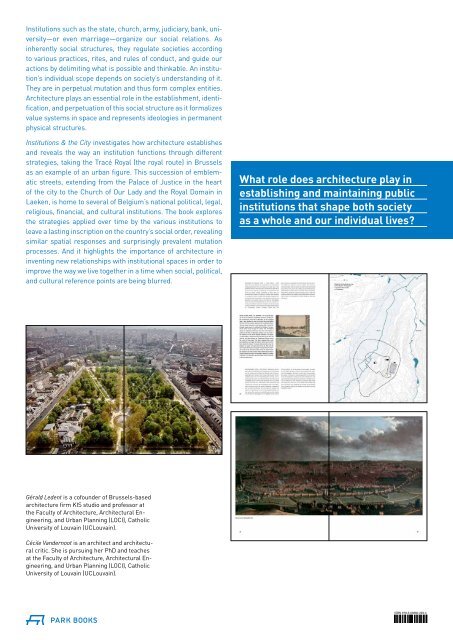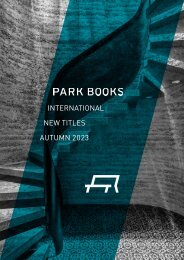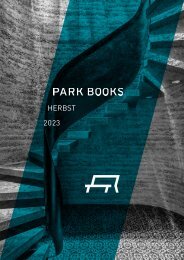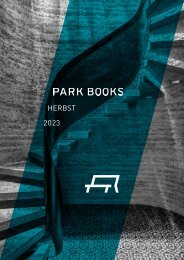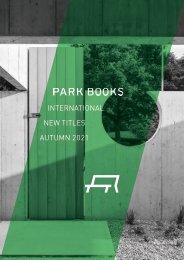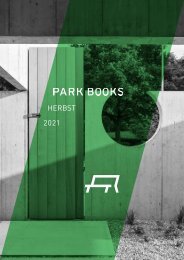Park Books International New Titles Autumn 2022
Create successful ePaper yourself
Turn your PDF publications into a flip-book with our unique Google optimized e-Paper software.
Institutions such as the state, church, army, judiciary, bank, university—or<br />
even marriage—organize our social relations. As<br />
inherently social structures, they regulate societies according<br />
to various practices, rites, and rules of conduct, and guide our<br />
actions by delimiting what is possible and thinkable. An institution’s<br />
individual scope depends on society’s understanding of it.<br />
They are in perpetual mutation and thus form complex entities.<br />
Architecture plays an essential role in the establishment, identification,<br />
and perpetuation of this social structure as it formalizes<br />
value systems in space and represents ideologies in permanent<br />
physical structures.<br />
Institutions & the City investigates how architecture establishes<br />
and reveals the way an institution functions through different<br />
strategies, taking the Tracé Royal (the royal route) in Brussels<br />
as an example of an urban figure. This succession of emblematic<br />
streets, extending from the Palace of Justice in the heart<br />
of the city to the Church of Our Lady and the Royal Domain in<br />
Laeken, is home to several of Belgium’s national political, legal,<br />
religious, financial, and cultural institutions. The book explores<br />
the strategies applied over time by the various institutions to<br />
leave a lasting inscription on the country’s social order, revealing<br />
similar spatial responses and surprisingly prevalent mutation<br />
processes. And it highlights the importance of architecture in<br />
inventing new relationships with institutional spaces in order to<br />
improve the way we live together in a time when social, political,<br />
and cultural reference points are being blurred.<br />
What role does architecture play in<br />
establishing and maintaining public<br />
institutions that shape both society<br />
as a whole and our individual lives?<br />
Gérald Ledent is a cofounder of Brussels-based<br />
architecture firm KIS studio and professor at<br />
the Faculty of Architecture, Architectural Engineering,<br />
and Urban Planning (LOCI), Catholic<br />
University of Louvain (UCLouvain).<br />
Cécile Vandernoot is an architect and architectural<br />
critic. She is pursuing her PhD and teaches<br />
at the Faculty of Architecture, Architectural Engineering,<br />
and Urban Planning (LOCI), Catholic<br />
University of Louvain (UCLouvain).<br />
ISBN 978-3-03860-293-4


